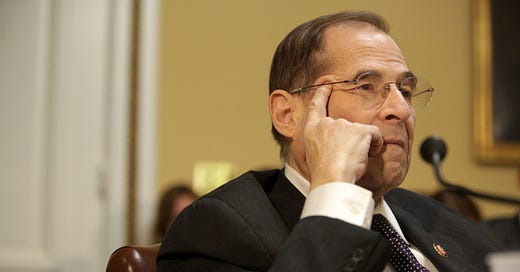Why Congress Is (Properly) Redoing Much of the Mueller Probe
Remember: There may be no wildly revealing public report from the special counsel.
With Democrats in Congress launching a flurry of investigations into all-things-Donald J. Trump, it makes sense to wonder: Why all this hullabaloo? After all, Special Counsel Robert Mueller has not officially ended his probe, and when he does, many people anticipate a potentially blockbuster report to Congress chock full of detailed information about what Mueller found regarding possible wrongdoing by this president.
To be sure, the congressional probe is huge in scope. The House Judiciary Committee already reportedly tapped “81 people and entities—including the White House, the Justice Department, senior campaign officials, Trump Organization officials and the President’s sons” on topics that include “possible corruption, obstruction of justice, hush-money payments to women, collusion with Russia and allegations of the President abusing his office and using it for personal gain.”
Predictably, Republicans are crying foul. White House Press Secretary Sarah Huckabee Sanders called the House investigation a “disgraceful and abusive . . . fishing expedition.”
Meanwhile, Amazon is taking pre-orders of the elusive “Mueller report”—one publisher promises to provide it complete with commentary by Trump advocate and law professor Alan Dershowitz.
But the Mueller report frenzy could be a fool’s errand.
What’s not sinking into the broader American consciousness is the fact that there may well not be anything resembling a searing public Mueller report. The language of the special counsel regulations does not expressly allow for public consumption of Mueller’s findings. As former FBI Director James Comey recently explained in an op-ed for the Washington Post, while there is precedent for the Department of Justice to release investigatory material regarding unindicted individuals, it is not the norm. The discretion on that front lies entirely in the hands of an unelected member of Trump’s Cabinet, Attorney General William Barr.
Circling back to the question of whether the widespread House investigations are warranted, therefore, House Judiciary Chairman Jerry Nadler explained it this way: "Before you impeach somebody, you have to persuade the American public that it ought to happen.”
Couple the muddled special counsel regulations with DoJ guidance suggesting that indictment of a sitting president would be unconstitutional, and we get the perfect storm: a president above the law by virtue of “rules” laid down by people within the president’s own chain of command—i.e., DoJ lawyers.
If the American people are to expect any accountability in the White House, then, it must be through Congress. Importantly, impeachment may turn out to be the only feasible pathway to ping Trump for his apparent commission of a felony under the federal campaign finance laws along with his former lawyer, Michael Cohen.
In short, if Mueller can’t disclose his findings, Congress must stage a do-over. The happy news is that such an effort necessarily implicates American voters, who will be placed in a position to judge Team Trump for themselves through public hearings—rather than from the cold words on the page of a hypothetical special counsel report.





